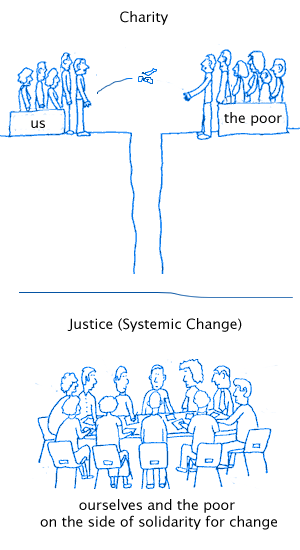 Systemic change has many names. This article “The Rise of Antipoverty Relational Work” uses terminology, “relational work”, not familiar to most in the Vincentian Family, to describe nonprofits revolutionary change in approach to solutions to poverty.
Systemic change has many names. This article “The Rise of Antipoverty Relational Work” uses terminology, “relational work”, not familiar to most in the Vincentian Family, to describe nonprofits revolutionary change in approach to solutions to poverty.
Whatever the name, the emphasis is on going from a “transactional” to a “transformational” mode that is oriented to getting people out of poverty long-term rather than just serving immediate needs. A shift from services for the poor to services with them. It’s a revolutionary approach.
Michael Jindra & Ines W. Jindra write
In the past few years, the Society of St. Vincent de Paul has been undergoing a similar shift to “end poverty through systemic change.” Traditionally favoring parish-based assistance, such as the delivery of food or clothing through home visits by volunteers, members are now incorporating an approach that looks at long-term needs.
These agencies and others have met annually since 2011 to “re-imagine the way America addresses poverty.”
They continue with what’s behind the trend which we define in terms of systemic change…
These nonprofits know the challenges of poverty and of leaving it behind. They witness the cycle of poverty in families and see their diversity close-up. Though many just need one-time help, others need ongoing personal assistance through case management or other programs, since they come back repeatedly for help. Instead of just treating the symptoms of poverty, staff members at several agencies say that they want to help people get out of poverty.
A Society of St. Vincent de Paul chapter executive director explained the shift by using the “teach them how to fish” metaphor, in contrast to simple handouts where there is no attempt to understand deeper needs. The CEO at one Catholic Charities location described it as a shift from “transactional” to “transformational” practice, and also a shift back to a time when private organizations played a stronger, more personal role in assisting the poor, before cash-based assistance became standard. One could also say that nonprofits are trying to shift from services for the poor to services with them.
For the three largest national organizations that provide direct aid to the poor—the Salvation Army, Catholic Charities, and St. Vincent de Paul—- the trend toward ongoing relational work is a major shift in philosophy and practice. The Salvation Army previously provided financial help with utility bills, rent, and other needs, but with only minimal interaction between staff and client. Its new Pathway to Hope program takes a case management approach that focuses on “client needs through a strength-based lens,” and involves regular meetings with social workers for activities such as one-on-one counseling and life skills training.
Catholic Charities, a decentralized network of more than 160 local agencies and 2,759 sites, has made the same kind of changes over the last 10 years. The majority of its funds goes to food banks and pantries, but its ever-expanding relational work includes forming individual opportunity plans for clients, and offering financial literacy and other programs that help them make smart choices about finances. One Catholic Charities CEO described this change as going from a “transactional” to a “transformational” mode that is oriented to getting people out of poverty long-term rather than just serving immediate needs.
Stanford Social Innovation Review is an award-winning magazine and website that covers cross-sector solutions to global problems. SSIR is written for and by social change leaders in the nonprofit, business, and government sectors who view collaboration as key to solving environmental, social, and economic justice issues. Published at the Stanford Center on Philanthropy and Civil Society at Stanford University,SSIR bridges academic theory and practice with ideas about achieving social change. SSIR covers a wide range of subjects, from microfinance and green businesses to social networks and human rights. Its aim is both to inform and to inspire.







0 Comments